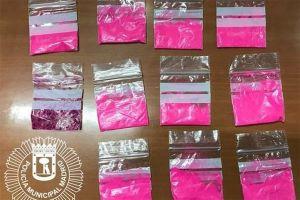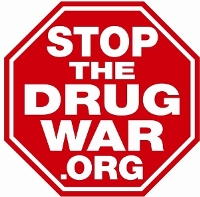A Minnesota task force recommends decriminalizing psilocybin mushrooms, New Hampshire lawmakers reject therapeutic psychedelics bill, and more.
Hawaii wants to see what a legal marijuana market in the state would look like, the death toll continues to rise from Sinaloa Cartel faction fights, and more.
The Mexican federal government has sent hundreds of troops into the country's lime-producing heartland to help growers fend off drug cartels, and more.
The Supreme Court today heard oral arguments in the case of a trucker fired for testing positive for marijuana who is suing the company that sold him a supposed CBD product, and more.
A pair of Canadian activists arrested for selling "safe supply" drugs are challenging the country's drug law, Delaware's governor signs a marijuana banking protection bill, and more.
The former Mexican public security minister -- the guy in charge of Mexico's drug war -- heads to federal prison for taking bribes from the Sinaloa Cartel, and more.
The DEA is ringing the alarm bell about the synthetic drug "pink cocaine" in New York City, and more.
A lying Houston narc gets decades in prison for a drug raid that left two innocent civilians dead, a Mississippi cop falls asleep in his squad car with a meth pipe in his hand, and more.
A Minnesota task force recommends decriminalizing psilocybin mushrooms, New Hampshire lawmakers reject therapeutic psychedelics bill, and more.

Psilocybin mushrooms are getting a lot of attention in state legislatures these days. (Greenoid/Flickr)
Marijuana Policy
Arizona Appeals Court Rules Marijuana Users Must Be "Impaired" to Face DUI Penalties. The state Court of Appeals has ruled that the state cannot suspend someone's driver's license solely because of the presence of THC in their bloodstream. Instead, authorities must show that the driver was actually impaired.
The ruling came in the case of Aaron Kirsten, whose license was suspended for 90 days after he tested positive for THC during a traffic stop. He filed an administrative appeal saying he had not ingested marijuana for at at least 24 hours and that he was not impaired, but the administrative judge said that was "irrelevant." The Maricopa County Superior Court agreed.
But the appellate court said the lower courts were mistaken and had ignored voter-approved laws that bar the state from punishing drivers who had used marijuana but were not impaired at the time of contact with law enforcement.
"This reinforces our understanding of the voters' intent, expressed through their enactment of Proposition 207, that unimpaired driving after consuming marijuana cannot be penalized," the unanimous three-judge panel wrote.
Psychedelics
Minnesota Task Force Recommends Decriminalizing Psilocybin Mushrooms. The state legislature created the Psychedelic Medicine Task Force to assess the potential therapeutic use of psychedelics and recommend appropriate changes to state law based on that assessment. Now, the task force has come out in favor of decriminalizing psilocybin mushrooms and called for a state program to regulate their use in medical treatments.
A majority of task force members favored legalizing the 'shrooms, but they fell short of the supermajority needed to make an official recommendation.
The recommendations are not legally binding but will be submitted to the legislature in a report later this year.
New Hampshire Lawmakers Reject Psychedelic Legalization. The House Health, Human Services and Elderly Affairs Committee on Wednesday killed a bill that would have legalized some psychedelics for medical purposes, House Bill 1693.
The bill would have created six "alternative treatment centers" where patients could purchase and consume psychedelics such as LSD, mescaline, and psilocybin for the treatment of disorders such as PTSD and depression. It would also have allowed for the personal possession of up to two ounces of "usable psychedelics."
But lawmakers from both parties balked.
"The concerns we had with the bill as presented was it was far too broad," Rep. Lucy Weber (D) said.
"I can't tell you how many times I've heard something about a [Journal of the American Medical Association] article comparing psychedelics to existing antidepressants," Rep. Erica Layon (R) said. "But right now, New Hampshire law prohibits a clinical trial from happening in the state with psychedelics because of its status as a controlled substance."
New Jersey Bill Allowing Psilocybin Mushrooms for Therapeutic Use Advances. The Senate Budget Committee on Monday unanimously approved a bill that would legalize and regulate psilocybin treatment centers for people with illnesses or behavioral problems that the drug could treat, Senate Bill 2283.
Companion legislation, Assembly Bill 3852, is also moving. The Assembly Health Committee approved it in June and it awaits a floor vote.
The Senate bill is sponsored by Sen. Nick Scutari (D), who last year sponsored a similar bill that would have allowed adults to possess up to four grams of psilocybin. That provision is not in the current bill.
The bill would create a 15-member commission to study the issue for 18 months and then make recommendations on implementing the bill. Licensing would begin after that period but no later than 24 months after the bill's effective date.
The bill also contains social equity provisions and would give preference to people who lived in a "distressed area" for five of the last 10 years, hire a workforce of whom half live in a "distressed area," or who demonstrate economic need.
back to top
Hawaii wants to see what a legal marijuana market in the state would look like, the death toll continues to rise from Sinaloa Cartel faction fights, and more.

TD Bank got caught doing money laundering for drug traffickers, among others. They paid a huge fine, but nobody went to jail. (Pixabay)
Marijuana Policy
Hawaii Officials Seek Expert Analysis on Potential Marijuana Market Demand as Lawmakers Continue to Consider Legalization. The state Office of Medical Cannabis Control and Regulation (OMCCR) is seeking to assess the state of the state's medical marijuana program and estimate demand for recreational marijuana if the state moves forward with legalization.
The OMCCR has issued a request for proposals (RFP) seeking input from existing vendors to "conduct an independent assessment of the Medical Cannabis Dispensary Licensing framework and an analysis of the demand for cannabis, both for medical cannabis and adult-use, in Hawaii should the state legalize adult-use of cannabis."
While lawmakers have fought for years to pass marijuana legalization, it has yet to happen. The Senate approved one such bill in March only to see it die in the House.
"In recent years, there has been growing interest in the legalization of cannabis for adult use," the RFP says. "OMCCR requires a market demand study to predict total demand (including demand from Hawaii residents and tourists) for cannabis and cannabinoid product from all sources, including medical cannabis, adult-use cannabis, home cultivation, hemp-derived cannabinoid products, and the illicit market," the notice says.
"The market demand study should also assess the economic impact of an adult-use cannabis program, as well as its effects on the medical cannabis program, public health and safety, and environmental health and safety. The assessment and study will guide the development of regulatory frameworks, including licensing, production quotas, and taxation levels. They will inform the planning of policies, education campaigns, and measures to protect public health and safety and environmental health and safety."
Interested parties have until November 1 to reply to the RFP, and the selected party will have until March 15, 2025, to file a final report. There is a $94,100 paycheck for whoever gets the gig.
Law Enforcement
Country's 10th Largest Bank Pleads Guilty to Bank Secrecy Act and Money Laundering Conspiracy Violations in $1.8B Resolution. The 10th largest bank in the United States, TD Bank, and its parent company TD Bank US Holding Company (TDBUSH) pleaded guilty Thursday and agreed to pay over $1.8 billion in penalties to resolve the US Attorney's Office for the District of New Jersey and the Justice Department's investigation into violations of the Bank Secrecy Act (BSA) and money laundering.
The bank pleaded guilty in a New Jersey federal district court to conspiring to fail to maintain an anti-money laundering program that complies with the BSA, failing to file accurate Currency Transaction Reports (CTRs), and money laundering.
"TD Bank prioritized growth and convenience over following its legal obligations. As a result of staggering and pervasive failures in oversight, it willfully failed to monitor trillions of dollars of transactions -- including those involving ACH transactions, checks, high-risk countries, and peer-to-peer transactions -- which allowed hundreds of millions of dollars from money laundering networks to flow through the bank, including for international drug traffickers. The bank was aware of these risks and failed to take steps to protect against them, including for two networks prosecuted in New Jersey and elsewhere -- one that dumped piles of cash on the bank's counters and another that allegedly withdrew amounts from ATMs 40 to 50 times higher than the daily limit for personal accounts," said US Attorney for the District of New Jersey Phillip Sellinger.
"By making its services convenient for criminals, TD Bank became one," said Attorney General Merrick B. Garland. "Today, TD Bank also became the largest bank in US history to plead guilty to Bank Secrecy Act program failures, and the first US bank in history to plead guilty to conspiracy to commit money laundering. TD Bank chose profits over compliance with the law -- a decision that is now costing the bank billions of dollars in penalties. Let me be clear: our investigation continues, and no individual involved in TD Bank's illegal conduct is off limits."
As part of the plea agreement, TD Bank has agreed to forfeit $452,432,302.00 and pay a criminal fine of $1,434,513,478.40, for a total financial penalty of $1,886,945,780.40. TD Bank has also agreed to retain an independent compliance monitor for three years and to remediate and enhance its AML compliance program.
Attorney General Garland threatened possible criminal prosecution, but that has not happened yet. That is not the case for people accused of federal drug offenses, who are routinely prosecuted and imprisoned -- not just fined -- for their crimes.
Maryland Cancels Supervision, Drug-Testing Debt for Everyone on Parole. Gov. Wes Moore (D) last week announced that the state has canceled more than $13 million in debt that parolees owed for unpaid supervision or drug testing fees. The move came just days after he signed into law a bill, House Bill 531, that waives those fees going forward.
The debt cancellation will directly benefit 6,715 people. It does not apply to other parole-related debts nor to probation-related debts. Prior to these moves, parolees faced $40 to $50 each month in supervision fees and $100 for each random drug and alcohol test.
"Even the most motivated people coming home from prison have trouble getting a job, whether because of the scarlet letter of their criminal record, struggles with substance abuse or just managing that difficult transition to life back in the real world," said Attorney General Anthony G. Brown (D. "By waiving supervision fees, which disproportionately impact low-income communities and people of color, Governor Moore and the General Assembly are easing financial burdens on Marylanders trying to get their lives back on track. These changes will also lower the risk of recidivism and help advance our shared goal of eliminating mass incarceration," he added.
International
Mexico Cartel Infighting Continues, Sinaloa Governor Now Under Investigation. The death toll from factional fighting for control of the Sinaloa Cartel has risen to more than 150 in the weeks since cartel cofounder Ismael "El Mayo" Zambada was kidnapped and delivered to US authorities by one of the sons of imprisoned cartel co-founder Joaquin "El Chapo" Guzman, who also turned himself in. The casualties include not only cartel gunmen but also civilians and members of the Mexican armed forces.
The fight for control between "Los Chapitos" and "La Mayiza" has led to increased federal scrutiny of ties between the cartel and state and local authorities. Last week, the army confiscated the weapons of some members of the local police in Culiacan, the state capital, suspecting they were working with the cartel or carrying unregistered firearms. The city has been wracked by cartel violence for weeks.
Now, Governor Ruben Rocha Moya is being investigated by federal authorities for ties to "Los Chapitos." Zambada has alleged that he was taken to Rocha's residence for a supposed meeting with the governor only to instead be kidnapped and sent across the border into the waiting arms of US officials. And an intelligence report from SEDENA (the Mexican defense ministry) details cooperation between Rocha and "Los Chapitos." The report also says that it is watching Rocha Moya's son, José Rocha Ruiz, for being a possible intermediary between his dad and the Sinaloa Cartel faction.
Rocha is now sweating bullets amidst the cartel war. The SEDENA report said he has become "extremely nervous" and "deeply worried" about his and his family's safety since Zambada was detained, fearing retaliation from his faction members. Rocha is now being guarded 24/7 by members of the National Guard and the Navy, with armored trucks and snipers at the ready.
Rocha has maintained his innocence, saying of the investigation that "nothing would be found" and that the media is exaggerating what is going on in the state. "Sinaloa is not among the most violent states, we are below the national average," he argued.
back to top
The Mexican federal government has sent hundreds of troops into the country's lime-producing heartland to help growers fend off drug cartels, and more.

Mexican lime producers are being targeted by drug cartels that want to expand their extortionate operations. (Creative Commons)
Marijuana Policy
Kamala Harris Pledges to Federally Legalize Marijuana. Vice President and Democratic presidential nominee Kamala Harris pledged on Monday to legalize marijuana at the federal level, ensuring that "safe cultivation, distribution and possession of recreational marijuana is the law of the land."
Harris said in a statement that legalizing recreational pot will "break down unjust legal barriers that hold Black men and other Americans back."
Her pledge came as part of a broader package of initiatives targeting Black male voters, who some polling suggests may be amendable to attention from the Trump campaign. She also said she would invest in more Black male teachers, create a health equity initiative for Black men, and offer a million forgivable loans to Black entrepreneurs. She also sought to position herself in juxtaposition to the Trump administration’s response to state-level legalization efforts. "It's a stark contrast with Donald Trump, whose Department of Justice threatened federal prosecutions for marijuana in states where marijuana use is legal, threatening the unjust and disproportionate use of marijuana possession laws to put Black Americans behind bars," the Harris campaign said.
While the Trump Justice Department struck down Obama administration guidelines instructing federal prosecutors not to interfere in legal marijuana states, Trump has recently said he would support the marijuana legalization initiative on this year's ballot in Florida.
New Jersey Bans Sale of Intoxicating Hemp Products -- Or Does It? As of this past weekend, the sale of intoxicating hemp products is forbidden in the state. Except that it isn't.
An amended hemp bill signed into law last month by Gov. Phil Murphy (D) attempted to regulate intoxicating hemp products, including delta-8 and THC-infused seltzers. It required manufacturers and retailers to obtain a license from the New Jersey Cannabis Regulatory Commission and included a ban on those products until regulations were created.
But a federal judge ruled last Thursday that parts of the new hemp law were invalid because they gave an unfair advantage to in-state hemp businesses. That same day, the Cannabis Regulatory Commission announced that it would only enforce the age-restriction provisions of the hemp law and not enforce other provisions, including the temporary ban on intoxicating hemp products, while the court decision is under appeal.
All the maneuvering is leaving the hemp industry -- sellers and producers of both intoxicating and non-intoxicating hemp products alike -- uncertain of its future in the state.
"I don't think this did any favors for the hemp industry," said Joshua Bauchner, an attorney representing cannabis and hemp clients across New Jersey. "What we have now is that the whole hemp industry is going to be subject to the CRC."
"When you rush a bill through, when you don't allow the discourse to happen, you end up passing a bill that falls short," said Philip Petracca, owner of the hemp company Bella Ray Beverage. "As quickly as they rushed this bill through, there should be that same sense of urgency to fix this."
And there is talk of a legislative fix. Senate Majority Leader Teresa Ruiz, D-Essex, said she was "committed to working with the administration and the assembly to clarify any necessary technical details. While I am pleased that the court order upheld the ban on selling intoxicating hemp products to minors, we must recognize that, without comprehensive regulation, these substances will continue to present a significant threat to the health and well-being of our communities," she said. "Other states have been successful in this pursuit, and New Jersey should be no different."
International
Mexico Sends Troops to Protect Michoacan Lime Growers from Drug Cartels. The Mexican Defense Department (SEDENA) has deployed 660 soldiers and militarized national guard officers to the western state of Michoacan after lime growers there complained of extortion by drug cartels.
The soldiers are visiting packing houses, escorting trucks filled with limes, and patrolling around wholesale markets in the state's main producing areas, including the towns Apatzingan, Aguililla and Buenavista. Those locations have been the scene of intense conflicts among rival cartels in past years, but this year it is a group known as Los Viagras who are raising tensions.
In August, threats from the group led producers to shut down operations, prompting the federal response after the state government claimed the shutdown was mainly because growers were unhappy with the prices they were getting.
Drug cartels have broadened the scope of their operations to include extorting legitimate sectors of the economy. Indeed, the largest vigilante movement in recent Mexican history was among lime growers in Michoacan in 2013, who clashed repeatedly with cartel gunmen.
In another sign of cartels expanding their reach, the Oxxo convenience store chain (the Mexican equivalent of 7-11) closed all 191 of its stores in the city of Nuevo Laredo, citing cartel extortion efforts.
(This article was prepared by StoptheDrugWar.org's 501(c)(4) lobbying nonprofit, the Drug Reform Coordination Network, which also pays the cost of maintaining this website. DRCNet Foundation takes no positions on candidates for public office, in compliance with section 501(c)(3) of the Internal Revenue Code and does not pay for reporting that could be interpreted or misinterpreted as doing so.)
back to top
The Supreme Court today heard oral arguments in the case of a trucker fired for testing positive for marijuana who is suing the company that sold him a supposed CBD product, and more.

The Supreme Court is hearing a case about whether a trucker fired for testing positive for THC can sue a medical marijuana company under the RICO Act. (Creative Commons)
Marijuana Policy
Justice Department Tells Appeals Court It Should Uphold Federal Marijuana Prohibition. The Justice Department last Thursday filed a brief with the 1st Circuit Court of Appeals arguing that Congress maintains broad authority to regulate marijuana and urging the court to uphold the federal ban on marijuana. The move comes in a case where several marijuana companies are seeking to overturn the Controlled Substances Act.
"Congress was acting well within its authority to 'make all laws which shall be necessary and proper' to 'regulate Commerce… among the several States,'" the Justice Department argued, citing Supreme Court precedent.
The marijuana companies, led by Canna Provisions, are trying to revive a lawsuit that was dismissed earlier this year in federal district court. That lawsuit was thrown out after the judge ruled that only the Supreme Court could overturn the 2005 Gonzalez v. Raich decision upholding federal marijuana prohibition.
The companies argued that because so many states have already legalized marijuana, federal prohibition is no longer justified.
"The ground-shaking shifts in marijuana regulation… together with the nation's long history of marijuana cultivation and use prior to the CSA, demonstrate the widely held understanding that Plaintiffs' marijuana activities implicate a liberty interest that requires protection," the companies argued in a court filing.
However the Justice Department argues that changing state laws do not weaken federal powers.
"Plaintiffs repeatedly note that many states have legalized medical and recreational marijuana, but Raich squarely held that state legalization of a controlled substance 'cannot retroactively divest Congress of its authority under the Commerce Clause,'" the department argued.
The 1st Circuit could hear oral arguments in the case later this year.
California Judge Denies TRO Request That Attempted to Halt State's Ban on Hemp-Derived THC Products. A state Superior Court judge has ruled that the state's ban on the sale of intoxicating hemp products can stand because hemp companies that challenged it did not show they suffered "irreparable harm" in requesting a temporary restraining order to block the ban.
The US Hemp Roundtable and several state hemp farmers and businesses had sought earlier this month to block emergency regulations banning hemp-derived THC and other intoxicating cannabinoids from store shelves. But Superior Court Judge Stephen Goorvitch demurred.
"Petitioners do not demonstrate that these regulations will cause widespread and catastrophic destruction of the hemp industry," Goorvitch wrote in a 12-page order denying the TRO. "As an initial matter, the court notes that at least half of [the USHR's] members operate outside California."
Goorvich did not mention it, but that's because the 2018 Farm Bill legalizing hemp allowed for interstate sales.
Under the emergency regulations, which went into effect September 23, industrial hemp food, beverages, and dietary supplements intended for human consumption can no longer contain detectable amounts of THC or any "comparable cannabinoid" per serving.
The hemp companies argued that the emergency regulations are "horrendous to industry participants such as farmers, manufacturers, distributors and retailers, who will suffer significant financial injury."
"Manufacturers can sell THC through the legal cannabis system in California, i.e., with a license,""Goorvitch retorted. "Putting aside that petitioners' declarations are speculative, at heart, they complain of lost revenue, which is not persuasive in establishing irreparable harm. The mere fact that these losses may be unrecoverable is not a basis to issue a temporary restraining order."
Drug Testing
Supreme Court Hears Case of Truck Driver Fired for Failed Marijuana Test Who Seeks to Sue CBD Product Supplier. The Supreme Court on Tuesday heard oral arguments in the case of a truck driver who sued a marijuana company after he was fired in the wake of a failed drug test after using its product, which he claims was falsely sold as not containing any THC.
The high court heard an appeal from Medical Marijuana, Inc. of a district court's decision to allow trucker Douglas Horn to sue it under the Racketeer Influenced and Corrupt Organizations (RICO) Act. This 1970 federal law was designed to crack down on organized crime and its economic impact. RICO's civil provisions allow "any person injured in his business or property" to seek triple damages from the defendant.
In 2012, Horn purchased a CBD tincture called Dixie X that was advertised as containing no THC. After a random drug test by his employer detected THC, he was fired from his trucking job.
In oral arguments, some justices were skeptical of Horn's claim. Justice Brett Kavanaugh worried about making it too easy for plaintiffs to bring civil RICO suits by characterizing personal injuries as injuries to business or property.
"That would be a dramatic, really radical shift in how tort suits are brought throughout the United States," Kavanaugh said. "And we would expect a clearer indication from Congress," Kavanaugh added.
But other justices appeared more sympathetic.
"If you're harmed when you lose a job, then you've been injured in your business, haven't you?," asked Justice Elena Kagan. "I guess what I'm saying is the simplest, clearest reading of this statutory language is it doesn't distinguish by what causes the harm," Kagan added. "It just says, if you're harmed in a way that's in your business or property, which has been understood to include being harmed by the loss of a job, and that's by reason of a (racketeering activity), then you're entitled to threefold the damages you would otherwise be."
Horn brought the lawsuit in 2015, arguing that the company was engaged in a "pattern of racketeering activity" that included violations of the Controlled Substances Act, mail fraud, and wire fraud by selling products that contained THC.
He lost at trial, but the 2nd US Court of Appeals revived his lawsuit, leading Medical Marijuana, Inc. to appeal to the Supreme Court. A decision is not expected for months.
back to top
A pair of Canadian activists arrested for selling "safe supply" drugs are challenging the country's drug law, Delaware's governor signs a marijuana banking protection bill, and more.

The Amazon rain forest in Ecuador. There is coca growing somewhere down there, and the Ecuadorian military is looking for it. (Creative Commons)
Marijuana Policy
Delaware Governor Signs Bill to Protect Banks That Work With Marijuana Businesses as Adult-Use Market Prepares for Launch. Gov. John Carney has signed into law legislation that will create state-level protection for banks that provide services to legal marijuana businesses, House Bill 355. Carney's signature comes nearly four months after the bill passed the legislature and as the state prepares for the inauguration of its legal adult-use marijuana market.
Sponsored by Rep. Ed Osienski (D), who has championed marijuana reform in Dover for years, the bill clarifies that financial and related service providers will not be subject to state-level prosecution for working with pot businesses.
Lawmakers "want Delaware’s safe and regulated industry to out-compete the illegal market," Osienski said. "By providing dispensaries with a secure avenue to banking and compliance services, we empower them to contribute positively to our economy, keep costs down for the industry and customers, employ local talent, and fulfill their tax obligations," he said.
The bill's synopsis says it "aims to facilitate the operation of cannabis-related businesses by helping to ensure that such businesses have access to necessary financial and accounting services."
In the meantime, the state now says the legal market should be up and running by March.
Hemp
US Army Bans Delta-8 THC. In an update of its drug policy, the US Army has banned delta-8 THC, a synthetic form of THC made from hemp-derived CBD. Although derived from low-THC hemp, delta-8 THC can alter consciousness.
The Army said it was banning delta-8 THC because it is widely accessible after passage of the 2018 Farm Bill, which legalized low-THC hemp and CBD but did not address intoxicating products derived from hemp. The Army already forbids the use of marijuana or other drugs.
The Army has moved to restrict marijuana and hemp derivatives before. In 2021, it banned the use of all hemp products, including CBD even though it is legal and unregulated at the federal level.
The new Army drug policy also includes measures to strengthen substance abuse programs and "deglamorize" illegal drug use. It also tightens rules around prescription drugs, requiring soldiers to renew their prescriptions every six months. Any positive drug tests for drugs prescribed more than 12 months previously could be treated as illegitimate. The Army says it maintains a zero-tolerance approach to drug and alcohol misuse.
International
Vancouver Activists Charged for Providing "Safe Supply" Drugs File Challenge to Federal Drug Laws. Two founders of the Drug User Liberation Front (DULF) charged in June with drug trafficking for providing "safe supply" drugs to users have launched a legal challenge to the federal drug laws. Jeremy Kalicum and Eris Nyx had been providing the drugs for the last two years, saying that they wanted to prevent drug user deaths from an impure illicit drug supply.
Their legal challenge argues that the current drug laws infringe on the life and liberty of illicit drug users by forcing them into unregulated illicit markets. It also argues that the drug laws amount to discrimination based on a disability -- addiction.
More than 11,000 people have died of drug overdoses in British Columbia in the past five years.
The DULF pair said Canada has failed to protect users by blocking access to "a regulated, predictable supply of substances," that they sold drugs to provide "regulated alternatives to street drugs" in the province, and that their club was a "sensible, rational and urgently needed response in a full spectrum of care" to address the overdose crisis.
In the lawsuit filed with the provincial Supreme Court, the pair asked for the drug trafficking charges against them to be dropped and that a section of the Controlled Drugs and Substances Act (CDSA) prohibiting the sale of illegal drugs be declared unconstitutional.
Ecuador President Says Country is Becoming a Coca-Cultivation Center. President Daniel Noboa, who has pledged to eradicate coca crops in his country, said in a radio broadcast Tuesday night that drug gangs have begun to grow "significant" amounts of coca inside the country. He said nearly 5,000 acres are currently being cultivated.
While Ecuador has seen rising levels of violence linked to the black market in drugs in recent years and now serves as a key transit hub for cocaine destined for Asia and Europe, significant coca growing inside the country would mark a turn for Ecuador -- and Noboa is not going to stand for it, he said.
"A message to the groups of narco-terrorists: We are not going to ignore this," Noboa said. He added that the military began eradication operations last week.
Noboa has declared a war on domestic drug gangs after winning a violence-plagued election a year ago. He enlisted the military to control prisons and patrol crime-battered urban areas. Still, that move left the military unable to monitor the border with Colombia as intensely as before, allowing gangs to increase coca production in the country.
back to top
The former Mexican public security minister -- the guy in charge of Mexico's drug war -- heads to federal prison for taking bribes from the Sinaloa Cartel, and more.
Psychedelics
Massachusetts Psychedelic Legalization Initiative in Tight Race, Poll Finds. A new poll from UMass Amherst/WCBV TV has the Question 4 psychedelic legalization initiative as a toss-up, with 43 percent of respondents in favor and 43 percent opposed. That leaves 14 percent undecided. If more than half the undecided vote in favor of the measure, it would then have a winning margin.
But the poll is not good news for the campaign. As a general rule, initiative campaigns want to go into the final weeks before an election with a 10 percent lead or greater because they fear they will lose some votes as opposition heats up and voters begin to really concentrate on the ballot.
"So this opens the door to a high likelihood of increased bombardment by supporters of this change and opponents of this change in the remaining weeks," said Tatishe Nteta, director of the UMass Poll.
Drug Policy
Drug Overdose Deaths Drop by Record Amount Over Past Year, CDC Says. According to provisional data released by the Centers for Disease Control and Prevention (CDC) Wednesday, overdose deaths dropped by 15 percent in the 12-month period ending in May 2024. That is the biggest decrease in overdose deaths ever recorded by the CDC.
Even though overdose deaths are declining, the toll is still staggering. According to the provisional data, 94,785 people died of drug overdoses in that 12-month period, and the toll could rise to as high as 98,820 when the numbers are finalized. Even if that figure is reached, it would still mark a decline in overdoses of 12.7 percent.
Driven largely by the arrival of fentanyl in illicit drug markets in the US -- but also by the prescription opioid epidemic in the 2000s and increased cocaine and methamphetamine deaths -- the annual overdose toll rose from about 5,000 a year at the beginning of the century to more than 100,000 a year in recent years.
Law Enforcement
Former Mexican Public Security Minister Sentenced to 38 Years in US Prison for Taking Bribes from Sinaloa Cartel. Genaro Garcia Luna, the man who led Mexico's descent into drug war violence as public security minister under then-President Felipe Calderon, has been sentenced to more than 38 years in federal prison after being convicted of accepting bribes from the Sinaloa Cartel. Observers had long noted that the Sinaloa Cartel appeared curiously unaffected by the Mexican government's shift from turning a blind eye to the cartels to going after them with the armed forces. Now, one reason why is evident.
Garcia Luna was convicted of engaging in a criminal drug enterprise, taking part in various conspiracies, and making false statements at his criminal trial in February 2023. He has been behind bars in the US since 2019.
Prosecutors presented compelling evidence that he had taken millions of dollars in bribes from the Sinaloa Cartel in exchange for protecting its members from arrest and ensuring its cocaine shipments to the US were unimpeded.
US District Court Judge Brian Cogan rejected prosecution requests for a life sentence, saying Garcia Luna should have "some light at the end of the tunnel," but added that he lived "a double life" and that the harm he had caused outweighed the good he had done. He also denounced Garcia Luna's character, saying, "Aside from your very pleasant demeanor and your articulateness, you have the same kind of thuggishness as El Chapo, it just manifests itself differently."
Garcia Luna's Sinaloa Cartel benefactor, El Chapo, is currently serving a life sentence in a US federal prison, while the cartel itself is violently splintering into factions linked to El Chapo and those linked to his erstwhile cartel co-leader and current US prisoner, Ismael "El Mayo" Zambada.
All of the criminal activity these men engaged in was made possible by the existence of the global drug prohibition regime.
back to top
The DEA is ringing the alarm bell about the synthetic drug "pink cocaine" in New York City, and more.

Pink cocaine or "tusi." The pink powder is named after the phenethylamine series 2C-B and may actually contain that substance.
California Takes Step to Keep Almost 500 Mendocino Pot Growers in the Legal Marketplace. The state Department of Cannabis Control (DCC) announced on Thursday that it had taken a long-awaited action to move Mendocino County legal marijuana growers more firmly into the legal market. The department said it had finally certified an Environmental Impact Report (EIR) for the county, which means growers there can move from provisional licensing to annual licensing.
There are 535 active licensed marijuana growers in the county, and 476 (89 percent) are listed as provisional licensees. Under state law, DCC cannot renew provisional licenses after the beginning of next year, and those provisional license holders must transfer to annual licensing by 2026 or get out of the legal market. The lack of an EIR has been a major obstacle to those growers getting annual licensing.
"Our goal has always been clear: to support those who helped build California's cannabis industry through a licensing program that is environmentally conscious and legally sound," DCC Director Nicole Elliott. "With the EIR certified, we're one step closer to keeping Mendocino's pioneering cannabis spirit alive."
Mendocino growers faced problems because local officials set up their program before state licensing was in place and did not align it with mandates for site-specific reviews under state environmental laws.
"Because the state requires a site-specific discretionary review of every single project in order to qualify for the state license and CEQA compliance, Mendocino County essentially didn't have a system to satisfy the state licensing requirements," said Genine Coleman, director of the Origins Council, a nonprofit that advocates for roughly 900 small, independent cannabis businesses and homestead farming families, primarily in the rural areas of Northern California.
Now with a certified EIR in place, the development of site-specific environment documents becomes much less onerous than it would have been otherwise, paving that pathway for Mendocino County cannabis cultivators to become compliant with state environmental regulations and obtain annual licensure.
"This project is a testament to what's possible when legal operators and local and state government work together towards addressing California Environmental Quality Act requirements and focus on meeting an important objective," said Mo Mulheren, chair of the Mendocino Board of Supervisors. "The solution developed and implemented by the Department of Cannabis Control and Mendocino County makes it possible for legacy cultivators to focus on what they do best -- growing high-quality cannabis legally by eliminating the final roadblocks," Mulheren said.
Drug Policy
Feds Warn About Pink Cocaine AKA "Tusi" in New York City. The DEA is issuing a new warning about a synthetic stimulant being peddled as "pink cocaine" or "tusi" in the city. The drug has picked up the "tusi" moniker after 2C-B, a series of psychedelic phenethylamines, even though it is not clear that any given sample of "pink cocaine" actually contains 2C-B.
"It's ketamine mixed with methamphetamine, ecstasy. It could be mixed with anything," said Bridget Brennan, New York City's special narcotics prosecutor. "It can put people into a 'k-hole' where they feel like they're in a blank space like they are disassociated from their body, they're disassociated from their brain, they don't know what's going on."
"It's being sold mostly online and through social media apps but being abused in the clubs in New York City," warned DEA New York City Special Agent in Charge Frank Tarentino.
He said that it goes for $20 to $100 a gram and he warned that it is showing up as an adulterant in other powder drugs.
"We're seeing more and more of this drug being mixed with fentanyl," Tarentino said.
The worries over "tuci" come as the city works its way through record-high drug overdose numbers, with more than 2,600 fatal overdoses in 2021, 3,026 in 2022, and 712 in the first quarter of 2003. But it is unclear if "tuci" is implicated in any of those deaths.
Puerto Rico Governor Agrees With Careful Drug Decriminalization, Not Legalization. Gov. Pedro Pierluis Urrutia said Thursday in response to a question about fentanyl deaths that he favored decriminalizing drugs but not legalizing them.
"This legalization thing is not for me," Pierluisi said. "Decriminalization could be done to a certain extent, but with great care and controls, because we do not want to encourage drug use in Puerto Rico; if anything, we want to discourage it."
But he seems willing to throw some drug users in jail anyway.
"I have always said that drug users, addicts, should not be imprisoned, except when it is a repeat offense and they are committing a series of crimes that do not provide alternatives," he continued.
The governor's comments came amid a spate of concern over fentanyl, with government officials calling on "anyone who buys any substance illegally to be aware of the risk that it may contain fentanyl." The same day the governor spoke, the island's Institute of Forensic Sciences confirmed that a series of overdose deaths in Arecibo implicated fentanyl, as well as cocaine and xylazine.
back to top
A lying Houston narc gets decades in prison for a drug raid that left two innocent civilians dead, a Mississippi cop falls asleep in his squad car with a meth pipe in his hand, and more.
In Martinville, Louisiana, a St. Martin Parish corrections deputy was arrested last Friday for drug distribution and unlawfully releasing law enforcement information. Corrections Officer Caliyah Joseph, 22, went down after an internal investigation by the sheriff's office. She is charged with one count of malfeasance in office and one count of criminal conspiracy to distribute Schedule 1 and/or Schedule V drugs and is now a former correctional officer.
In Yazoo City, Mississippi, a Belzoni police officer was arrested on October 6 after he was found passed out in his patrol vehicle with a meth pipe in his hand. Officer James Jackson was arrested by members of the Yazoo City Police Department. Arresting officers also found marijuana in the patrol car glove box. Jackson refused a sobriety test after being woken up and was charged with possession of paraphernalia and DUI refusal. While Jackson has been released on bond, more charges could be filed at a later time.
In Sacramento, California, a former state prison guard pleaded guilty on October 8 to conspiracy to possess and distribute cocaine. Fidel Andrade, 36, supplied cocaine to his co-defendant Neftali Castillo Montes. Montes then sold over 9 ounces of cocaine to an FBI confidential source. On March 3, 2021, officers discovered an additional ounce of cocaine during a search warrant executed at Andrade's house. He went down as part of an investigation by the California Department of Corrections and Rehabilitation, US Customs and Borders Protection, the Drug Enforcement Administration, Homeland Security Investigations, the Federal Bureau of Investigation, and the Tracy Police Department. He is set to be sentenced on January 28, 2025, and is looking at up to 20 years in federal prison.
In Detroit, a former Wayne County sheriff's deputy was sentenced on September 25 to more than six years in prison for his role in a drug trafficking conspiracy and a mail and wire fraud conspiracy. Former Deputy Michael Kenneth Cox helped two drug traffickers evade charges during his tenure with the force. In one case, seized drugs from a trafficker, but rather than arresting him, took the drugs and reimbursed the trafficker $2,000 for his lost dope. He also then gave him another $200 as a "confidential informant fee," claiming it had been a planned, controlled purchase.
Cox also arranged a cocaine transaction between two protected drug traffickers, the Justice Department said. A drug trafficker said Cox warned him about conducting a home invasion where authorities thought there was a large amount of drugs, and the invasion took place 10 days later. In another instance, one of Cox's protected traffickers shot and wounded a confidential informant, and Cox contacted investigators that same night to provide an alibi for his protected drug trafficker. Cox then assisted the drug trafficker with obtaining a defense attorney and lied about his contacts with the trafficker during the federal investigation.
In Providence, Rhode Island, a former Wyatt Detention Facility jail guard was sentenced on September 30 to time served plus two years of probation for trying to smuggle drugs into the jail. Kristopher White, 26, admitted in court that he met with an associate of an inmate, who gave him several pieces of paper soaked with drugs. White was arrested last December after leaving the jail during his shift and retrieving the drugs from his vehicle and then being searched as he reentered the facility. He pleaded guilty in May to attempting to provide contraband in a prison.
In Houston, a former Houston narcotics officer was sentenced last Wednesday to 60 years in prison in a case that began with a ginned-up no-knock raid on a pair of innocent homeowners in which the pair were both killed after opening fire on the people trying to break down their door. After a neighbor accused the couple of selling drugs to her daughter (she did not have a daughter, admitted she made the whole thing up and was convicted of a federal crime for her efforts), Gerald Goines. 60, headed a squad of narcotics officers who made up false information to submit a search warrant for the home. During his trial, his confidential informant testified that he had a pattern of asking her to make up nonexistent drug buys. He was convicted of two counts of murder in the deaths of homeowners Dennis Tuttle and Rhogena Nicholas and must serve at least half of his sentence before being eligible for parole.
back to top








